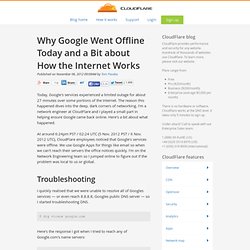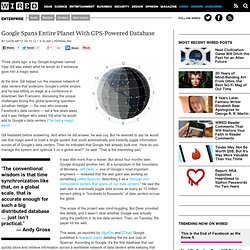

Why Google Went Offline Today and a Bit about How the Internet Works. Today, Google's services experienced a limited outage for about 27 minutes over some portions of the Internet.

The reason this happened dives into the deep, dark corners of networking. I'm a network engineer at CloudFlare and I played a small part in helping ensure Google came back online. Here's a bit about what happened. At around 6:24pm PST / 02:24 UTC (5 Nov. 2012 PST / 6 Nov. 2012 UTC), CloudFlare employees noticed that Google's services were offline. We use Google Apps for things like email so when we can't reach their servers the office notices quickly.
Troubleshooting I quickly realised that we were unable to resolve all of Googles services — or even reach 8.8.8.8, Googles public DNS server — so I started troubleshooting DNS. $ dig +trace google.com Here's the response I got when I tried to reach any of Google.com's name servers: The fact that no servers could be reached means something was wrong.
I started to look at the network layer, see if that's where the problems lay. The Fix. How a Google Headhunter's E-Mail Unraveled a Massive Net Security Hole. Mathematician Zach Harris, 35, of Jupiter, Fl., poses for a portrait on Tuesday.

Photo: Brynn Anderson/Wired It was a strange e-mail, coming from a job recruiter at Google, asking Zachary Harris if he was interested in a position as a site-reliability engineer. “You obviously have a passion for Linux and programming,” the e-mail from the Google recruiter read. “I wanted to see if you are open to confidentially exploring opportunities with Google?” Harris was intrigued, but skeptical. So he wondered if the e-mail might have been spoofed – something sent from a scammer to appear to come from the search giant. Then he noticed something strange. The problem lay with the DKIM key (DomainKeys Identified Mail) Google used for its google.com e-mails. For security reasons, the DKIM standard calls for using keys that are at least 1,024 bits in length. “I love factoring numbers,” Harris says. In the e-mail, he plugged his personal website: Wait, DevTools could do THAT? There is an entire performance talk in the above waterfall..

Fast TTFB for page header, but (very) slow body render Document parser doesn't wait, schedules the CSS The CSS is queued, waiting for first byte for over 1s! PreloadScanner can fetch resources while parser is blocked (early flush example) Ripping Off The Bloody Band-Aid. It’s really not that hard to understand.

Nor is it evil. Nor is it perfect. Nor is it the end of the world. It is what it is. And my bet is that, as usual, the outrage will be relatively short-lived. I’m talking, of course, about the Maps situation in iOS 6, and the Google/Apple war of words over it. Over the course of the past few weeks, we’ve seemingly heard all possible sides of the story. Make no mistake, both Google and Apple (or people associated with those companies) are behind the scenes trying to convey their side of the story through strategic leaks.
And it shouldn’t be surprising, from either side. Imagine if when the new Yankee Stadium was being built, the Yankees had to play all their games in Fenway Park. What makes this even more intriguing is that Apple and Google did originally team up in the space. Would Apple cut those same deals with the Google of today? Google Spans Entire Planet With GPS-Powered Database. Three years ago, a top Google engineer named Vijay Gill was asked what he would do if someone gave him a magic wand.

At the time, Gill helped run the massive network of data centers that underpins Google’s online empire, and he was sitting on stage at a conference in downtown San Francisco, discussing the unique challenges facing this globe-spanning operation. Jonathan Heiliger — the man who oversaw Facebook’s data centers — sat a few seats away, and it was Heiliger who asked Gill what he would add to Google’s data centers if he had a magic wand.
Gill hesitated before answering. And when he did answer, he was coy. But he seemed to say he would use that magic wand to build a single system that could automatically and instantly juggle information across all of Google’s data centers. ‘The conventional wisdom is that time synchronization like that, on a global scale, that is accurate enough for such a big distributed database … just isn’t practical.’ — Andy Gross. More guidance on building high-quality sites. Google Pulls Off Most Kick-A** Tech Demo Ever. SAN FRANCISCO—We didn't know what to expect when Google co-founder Sergey Brin suddenly appeared on the stage at Google I/O and interrupted Vic Gundotra's pitch for new features in Google+.

The first thing you noticed was that Brin was wearing Project Glass augmented reality goggles and that Gundotra was unperturbed enough to indicate that his boss showing up wasn't a total shocker. But what Brin showed us next certainly was. Here's what I wrote on PCMag's Google I/O live blog this morning: "Holy cow—Brin's having a Google+ hangout with some guys in a blimp above San Francisco via Google Glass.
They're going to fly down to Moscone in wingsuits, live on Google+! " Turns out that was just the start of some wild, live streamed, three-dimensional pwnage of an urban environment the likes of which we've never seen.